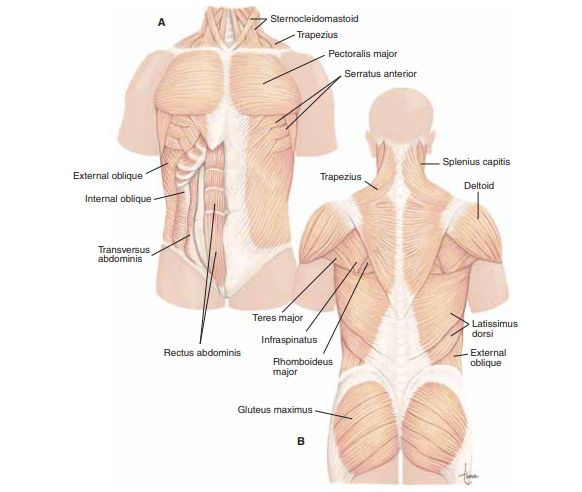Makindo Medical Notes"One small step for man, one large step for Makindo" |

|
|---|---|
| Download all this content in the Apps now Android App and Apple iPhone/Pad App | |
| MEDICAL DISCLAIMER: The contents are under continuing development and improvements and despite all efforts may contain errors of omission or fact. This is not to be used for the assessment, diagnosis, or management of patients. It should not be regarded as medical advice by healthcare workers or laypeople. It is for educational purposes only. Please adhere to your local protocols. Use the BNF for drug information. If you are unwell please seek urgent healthcare advice. If you do not accept this then please do not use the website. Makindo Ltd. | |
Anatomy of the Muscles of the Thoracic Region
-
| About | Anaesthetics and Critical Care | Anatomy | Biochemistry | Cardiology | Clinical Cases | CompSci | Crib | Dermatology | Differentials | Drugs | ENT | Electrocardiogram | Embryology | Emergency Medicine | Endocrinology | Ethics | Foundation Doctors | Gastroenterology | General Information | General Practice | Genetics | Geriatric Medicine | Guidelines | Haematology | Hepatology | Immunology | Infectious Diseases | Infographic | Investigations | Lists | Microbiology | Miscellaneous | Nephrology | Neuroanatomy | Neurology | Nutrition | OSCE | Obstetrics Gynaecology | Oncology | Ophthalmology | Oral Medicine and Dentistry | Paediatrics | Palliative | Pathology | Pharmacology | Physiology | Procedures | Psychiatry | Radiology | Respiratory | Resuscitation | Rheumatology | Statistics and Research | Stroke | Surgery | Toxicology | Trauma and Orthopaedics | Twitter | Urology
Anatomy

Diaphragm
Origin: Xiphoid process, costal margin, fascia over quadratus lumborum and psoas major muscles, vertebral bodies L1-L3
Insertion: Central tendon of the diaphragm
Action: Pushes abdominal viscera inferiorly, increasing thoracic cavity volume (inspiration)
Innervation: Phrenic nerve (C3-C5)
Artery: Musculophrenic a., superior phrenic a., inferior phrenic a.
Notes: The left crus attaches to L1-L2 vertebral bodies, the right crus attaches to L1-L3 vertebral bodies.
External Intercostal
Origin: Lower border of a rib within an intercostal space
Insertion: Upper border of the rib below, coursing downward and medially
Action: Keeps the intercostal space from blowing out or sucking in during respiration
Innervation: Intercostal nerves (T1-T11)
Artery: Intercostal a.
Notes: 11 in number; extend from the tubercle of the rib to the costochondral junction; continuous with the external intercostal membrane anteriorly.
Innermost Intercostal
Origin: Upper borders of a rib
Insertion: Inferior margin of the rib above
Action: Keeps the intercostal space from blowing out or sucking in during respiration
Innervation: Intercostal nerves (T1-T11)
Artery: Intercostal a.
Notes: These muscles have the same fiber direction as the internal intercostal muscles, lying deep to the intercostal neurovascular bundle.
Internal Intercostal
Origin: Upper border of a rib
Insertion: Lower border of the rib above, coursing upward and medially
Action: Keeps the intercostal space from blowing out or sucking in during respiration
Innervation: Intercostal nerves (T1-T11)
Artery: Intercostal a.
Notes: 11 in number; they extend from the margin of the sternum to the angle of the rib, continuous posteriorly with the internal intercostal membrane.
Levatores Costarum
Origin: Transverse processes of C7-T11
Insertion: Rib below its origin, medial to the angle
Action: Elevates the rib
Innervation: Dorsal primary rami of spinal nerves C7-T11
Artery: Deep cervical a., intercostal aa.
Notes: Small and relatively insignificant muscles.
Subcostalis
Origin: Angle of ribs
Insertion: Angle of a rib 2-3 ribs above its origin
Action: Compresses the intercostal spaces
Innervation: Intercostal nerves
Artery: Intercostal a.
Notes: Subcostalis, transversus thoracis, and innermost intercostal muscles form the deepest intercostal muscle layer.
Transversus Thoracis
Origin: Posterior surface of the sternum
Insertion: Inner surfaces of costal cartilages 2-6
Action: Compresses the thorax for forced expiration
Innervation: Intercostal nerves 2-6
Artery: Internal thoracic a.
Notes: Transversus thoracis, subcostalis, and innermost intercostal muscles form the innermost intercostal muscle layer.